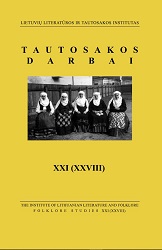Patarlių metaforikos savitumas
Peculiarities of the Proverb Metaphoric
Author(s): Dalia ČerniauskaitėSubject(s): Theoretical Linguistics, Semantics, Phraseology
Published by: Lietuvių literatūros ir tautosakos institutas
Keywords: metaphorical expression; proverbs; TP proverbs; PP proverbs; semantical harmony;
Summary/Abstract: According to the heterogeneity of metaphorical expression, existing within the genre of proverbs, the proverbs whose poetic is based on metaphors are divided into two types in this article, following the methodic devised by Estonian paremiologist Arvo Krikmann: i.e. the TP proverbs and the PP proverbs (T signifies the elements of proverbs perceived literally, while P stands for the elements perceived figuratively). The TP proverbs are heterogeneous, because they consist of both literally and figuratively perceived elements. The TP proverbs most frequently represent the poetical characterization of a certain object, supplying its vivid definition. As such texts record semantical incongruity, the direct interpretation of the whole statement comprising the proverb of this type is illogical and impossible. As a verb or a noun usually express the P element in such phrases, the poetic of a TP proverb is based on a substantival or a verbal metaphor. The PP proverbs are homogeneous, because the statement comprising proverb as a whole is perceived figuratively. The PP proverbs are based on sententious metaphors. Such metaphors do not presuppose breach of semantical harmony in the texts of proverbs; therefore the latter retain their trivially correct sense even on the T level (i.e. when perceived literally), nevertheless performing their contextual function only when perceived figuratively. The PP type proverbs are semantically dissonant only against their background. Unlike the verbal or substantival metaphors used in the TP proverbs, the sententious metaphors practically do not have equivalents in other genres of folklore, being partly cognate only with the riddle metaphors.
Journal: Tautosakos darbai
- Issue Year: 2005
- Issue No: 30
- Page Range: 122-132
- Page Count: 11
- Language: Lithuanian

